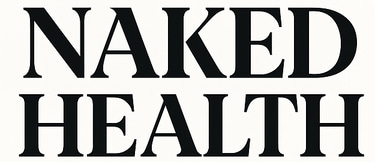Everyone Should be Taking Creatine. Yes, Even You
It’s not just for bodybuilders. Creatine is one of the most researched, effective, and safe supplements in the world—boosting strength, brain function, and even long-term health. Here’s why it belongs in every daily routine.
FUEL + FLOW
Hank Cramblin
8/11/20252 min read


Everyone Should Be Taking Creatine. Yes, Even You.
When most people hear “creatine,” they think of bulky gym bros and shaker bottles. But here’s the truth: creatine isn’t just a muscle-builder—it’s a brain booster, a recovery enhancer, and one of the most universally beneficial supplements ever studied.
With over 500 peer-reviewed studies supporting its safety and effectiveness, creatine has benefits far beyond the weight room. Let’s break down why you should be on it, the science that backs it, and how to take it for maximum results.
1. Strength, Power, and Muscle Growth
Benefit:
Creatine increases the body’s stores of phosphocreatine, a molecule that helps regenerate ATP—the energy currency of your cells—during high-intensity exercise. That means you can lift heavier, sprint faster, and recover quicker.
A meta-analysis in the Journal of Strength and Conditioning Research found creatine users gained ~8% more strength and ~14% more reps on average than non-users. (Source)
How to Apply:
Take 3–5g of creatine monohydrate daily, with or without food. No need to “cycle.”
2. Brain Function and Mental Sharpness
Benefit:
Creatine isn’t just in your muscles—it’s also in your brain, where it supports energy metabolism. Supplementation has been shown to improve working memory, reaction time, and mental clarity, especially in sleep-deprived or stressed individuals.
A double-blind study found that creatine improved cognitive performance in healthy adults, particularly under mental fatigue. (Source)
How to Apply:
If you work long hours, study intensely, or often feel mentally drained, creatine can help keep your brain firing on all cylinders.
3. Faster Recovery & Reduced Fatigue
Benefit:
Creatine helps reduce muscle cell damage and inflammation after intense exercise, allowing you to bounce back quicker. It also buffers lactic acid buildup, reducing post-workout soreness.
Research in Amino Acids found creatine reduced markers of muscle damage by up to 84% after exhaustive exercise. (Source)
How to Apply:
Consistency matters—creatine works best when levels stay elevated, so don’t skip rest days.
4. Bone and Aging Benefits
Benefit:
Emerging research suggests creatine, combined with resistance training, improves bone mineral density in older adults—potentially lowering fracture risk. It may also help counter age-related muscle loss (sarcopenia), a major predictor of poor health in aging populations.
A systematic review in Nutrients concluded that creatine plus resistance training significantly improved muscle strength and function in older adults. (Source)
How to Apply:
It’s never too late to start—creatine supports muscle and bone health at any age.
5. Safe, Affordable, and Easy
Benefit:
Creatine is one of the most tested supplements ever, with decades of research showing it’s safe for long-term use in healthy individuals. It’s also inexpensive—often less than $0.10 per serving.
The International Society of Sports Nutrition’s position stand calls creatine “one of the most effective nutritional supplements available” for improving high-intensity exercise performance. (Source)
How to Apply:
Stick to creatine monohydrate—it’s the most researched, most effective, and cheapest form. Avoid overpriced “designer” versions.
The Bottom Line
Creatine is not just a fitness supplement—it’s a performance, health, and longevity supplement. It’s safe, cheap, and backed by decades of research. Whether you’re a student, an athlete, or just someone who wants to think sharper and age stronger, creatine belongs in your daily routine.
